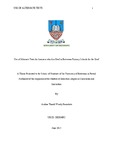| dc.contributor.author | Ramokate, Andina Thandi Wendy | |
| dc.date.accessioned | 2016-07-14T07:54:22Z | |
| dc.date.available | 2016-07-14T07:54:22Z | |
| dc.date.issued | 2016-07-14 | |
| dc.identifier.uri | http://hdl.handle.net/10311/1448 | |
| dc.description | A dissertation submitted to the School of Graduate Studies, Faculty of Education, University of Botswana in partial fulfilment of the requiremen for Master of Education Degree in curricum and instruction, Citation: Ramokate , Andina T. W. (2015) Use of alternate tests for learners who are deaf in Botswana primary schools for the Deaf, University of Botswana. | en_US |
| dc.description.abstract | This study was undertaken because of a concern that learners who are deaf and hard of hearing (DHH) in Botswana are performing poorly compared to their peers without DHH. The purpose of this study was to investigate if learners who are deaf and hard of hearing perform better in alternate forms of tests (sign language) compared to paper and pencil tests (standard tests). A one-group pre-tests-post-tests design experiment test was carried out to investigate if there is any significant difference between alternate test scores and standard tests scores. Five different tests were set from the same content, test 1 was Standard test: Written guided composition, test 2, Alternate Test 1: Fill in the Blanks, test 3 alternate test 2: Teacher Sign and Students responded by signing, test 4 alternate test 3: Signed English Multiple Choice Test and test 5 was alternate test 4: The teacher signed the passage while students wrote the composition. Tests were marked and percentage scores were coded and entered into SPSS version 20.0. Three hypotheses were proposed and were tested using independent t-test and dependent t-test at alpha level of .05. The findings reported that alternate test scores were higher than standard test scores. In short there is a significant difference between alternate test scores and standard test scores on performance of learners who are deaf. The major recommendation which can have a positive impact on this study is that deaf or hard of hearing learners need to be tested using alternate tests for them to have equal testing opportunities with the rest of the society. | en_US |
| dc.language.iso | en | en_US |
| dc.subject | Tests | en_US |
| dc.subject | Learners | en_US |
| dc.subject | deaf | en_US |
| dc.subject | Primary Schools | en_US |
| dc.subject | Botswana | en_US |
| dc.title | Use of alternate tests for learners who are deaf in Botswana Primary Schools for the Deaf | en_US |
| dc.type | Masters Thesis/Dissertation | en_US |
| dc.link | Unpublished | en_US |

